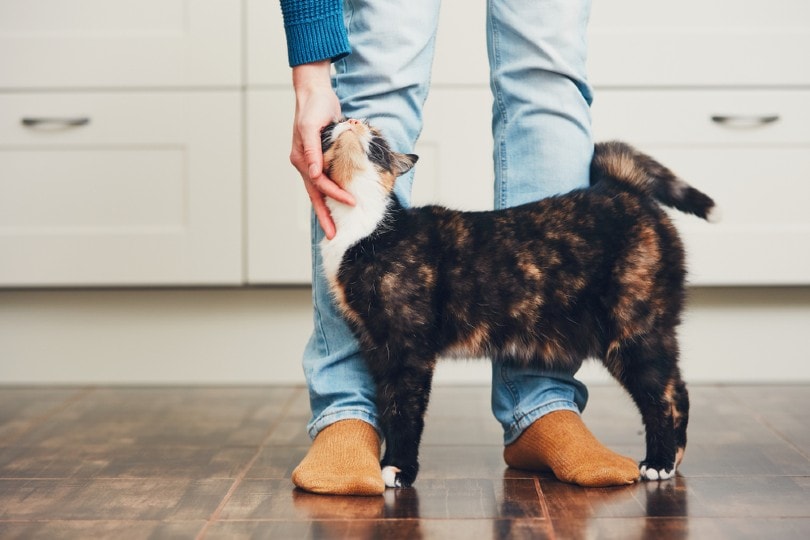
Click to Skip Ahead
If you own a cat, you’ve likely experienced the unique behavior of your feline friend rubbing against you. First, your cat arches their body and affectionately rubs their head or body against your legs, hands, or even your face. This is usually a familiar and appreciated gesture by many cat owners.
However, have you ever wondered why cats engage in this behavior?
Usually, your cat will rub against you for reasons such as scent marking and territory establishment, showing social bonding and affection, mimicking mutual grooming behavior, gathering information, and seeking comfort and security.
This article will explore why cats engage in this behavior and shed light on their instinctual and social motivations.
The 6 Reasons a Cat Rubs Against You
1. Marking Their Scent and Territory
Cats are territorial creatures, and scent marking helps define and defend their space. They rub against objects or individuals to create a scent boundary that signifies the limits of their territory to other cats.
They have scent glands in various areas of their bodies, such as their faces, sides of their heads, and tails. They also have scent glands near the base of the tail that they use to spread the scent and mark larger surfaces.
When your cat rubs against you, they mark their scent and establish their territory. They also leave their unique scent on your clothing or skin, effectively marking you as part of their territory and signaling to other cats that you belong to their social group.
In households with many cats, rubbing against you creates a shared scent environment, fostering harmony and a sense of belonging within the cat community.
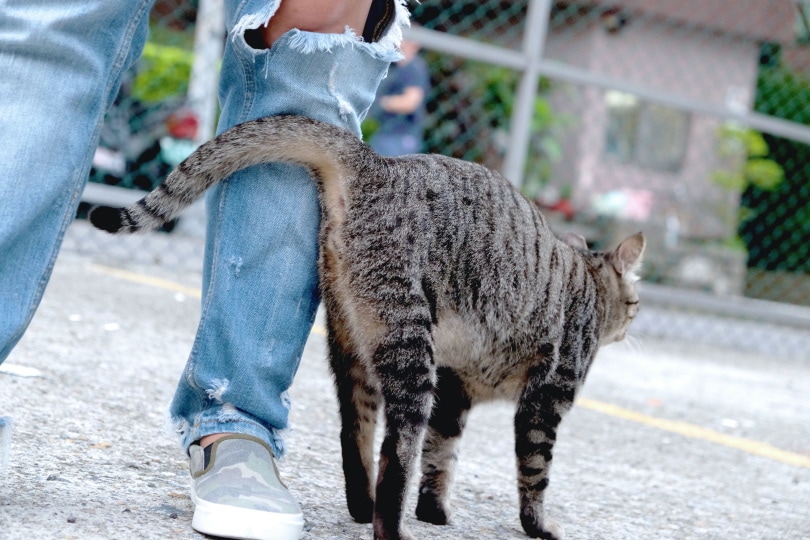
2. To Show Social Bonding and Affection
Cats are naturally independent. However, sometimes they want to form social bonds and share affection with you. In this case, rubbing against you displays a cat’s deep bond and attachment to you.
Rubbing behavior is also a way to strengthen the bond between you and your cat. These felines release endorphins, or feel-good hormones, when they rub against you, promoting their well-being and happiness.
Finally, rubbing against you is a silent form of intimacy. It is a subtle way for your cat to communicate their feelings without using words. Such contact conveys their contentment, happiness, and desire to be close to you.
3. To Mimic Mutual Grooming Behavior
Cats are naturally clean animals. They routinely engage in grooming to maintain their cleanliness and hygiene.
When they rub against you, they mimic mutual grooming, a social activity among cats.
In addition, mutual grooming is essential to social bonding among cats. The process involves one cat grooming another by licking and nibbling on them. Therefore, when your tabby rubs against you, it is engaging in a form of reciprocal care.
Therefore, rubbing means that they perceive you as part of their social group. It is also a way for cats to express their trust and affection by mimicking the grooming behavior they would engage in with other cats.

4. Seeking Comfort and Security
Your furry friend might be seeking reassurance and a sense of safety. Rubbing against you is their way of seeking solace and finding a safe space.
In addition, cats rely heavily on their sense of smell to navigate their environment. Rubbing against you allows them to leave their scent on you and use your scent as a source of comfort.
Your cat also uses such physical contact to mark you and the surrounding area as a safe zone. By leaving their scent on you, they create a boundary that signals to other animals that you are under their protection.
5. To Gather Information
Cats are naturally curious creatures. They use various senses to gather information about their surroundings. By rubbing against you, they acquire valuable information about the environment and other individuals. Cats use physical contact to learn more about you and your environment through two main methods.
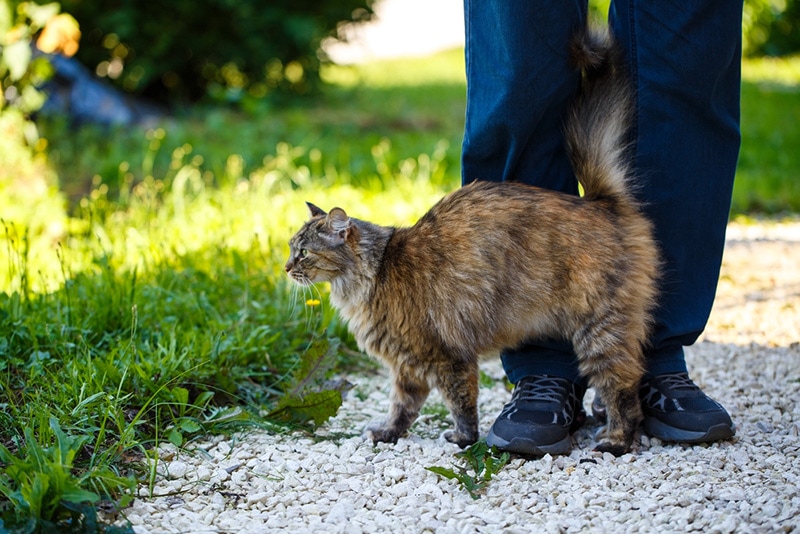
6. They Are in Estrus
Female cats experience periods of sexual receptivity known as being “in heat” or estrus. During this time, they may behave in a certain way to attract male cats and indicate their reproductive readiness. Rubbing against you can be one such behavior. It allows them to mark you with their scent and send out a signal to potential mates.
Rubbing against you also means that they are seeking attention and physical contact during this hormonally driven phase. They may purr, rub their heads against you, and exhibit more clingy behavior as they seek comfort and reassurance.
 What if They Rub Against Me Too Much
What if They Rub Against Me Too Much
While it is generally endearing when cats rub against you, there may be instances when their behavior becomes excessive. Here are a few considerations if your cat is rubbing against you excessively.
Overstimulation
Excessive rubbing may indicate that your cat is becoming overstimulated. Cats have a threshold for physical contact; when they exceed that limit, they may exhibit restlessness or agitation. Take time to observe your cat’s body language and respect their boundaries.
If you notice signs of overstimulation, such as tail flicking, flattened ears, or attempts to retreat, give your cat some space and allow them to calm down.
Attention-Seeking Behavior
Cats may also rub against you excessively as a way to seek attention. They may resort to persistent rubbing if they feel ignored or are craving interaction. Therefore, provide your cat with regular playtime, appropriate toys, and affectionate moments to fulfill their attention needs. This allows them to redirect their attention-seeking behavior.
Stress or Anxiety
Excessive rubbing can sometimes be a sign of stress or anxiety in cats. When cats feel anxious or overwhelmed, they may seek comfort and security through increased physical contact, including rubbing against you.
It is crucial to identify potential stressors in your cat’s environment, such as changes in routine, introduction of new pets, or loud noises, and address them appropriately. Creating a calm and enriched environment, providing hiding spots, and offering reassurance can help alleviate your cat’s anxiety.
Medical Concerns
In rare cases, excessive rubbing can signify underlying medical issues. Certain skin conditions, allergies, or pain can cause cats to exhibit increased rubbing behavior. Consult a veterinarian for a thorough examination if you notice any changes in your cat’s skin, fur, or overall health.
Your vet can determine if any underlying medical concerns contribute to excessive rubbing.
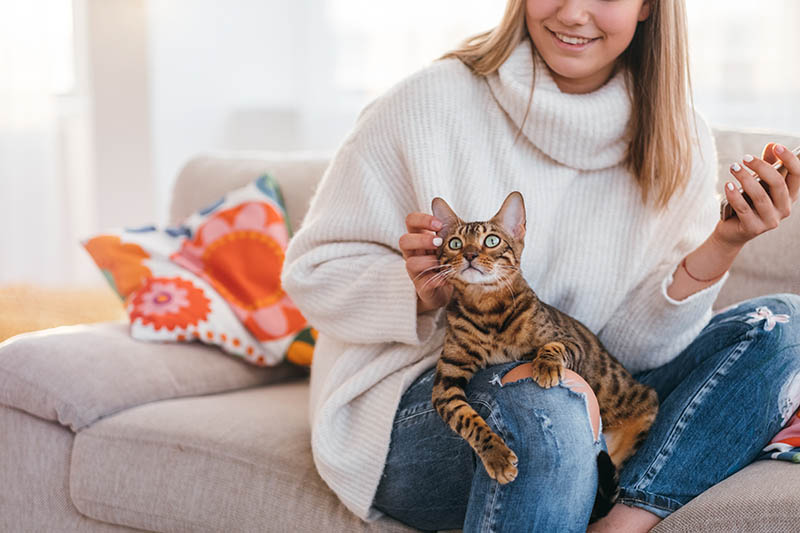
How to Keep Your Cat Happy & Healthy
Ensuring the well-being of your cat is essential for their overall health and happiness. Here are some key considerations to help you keep your feline companion healthy and safe.
Provide a Balanced Diet
A nutritious and balanced diet is crucial for your cat’s health. Talk to your vet about the appropriate type and amount of food for your cat based on age, weight, and specific dietary needs. Also, ensure their diet includes high-quality protein, essential nutrients, and an appropriate balance of wet and dry food to support their overall well-being.
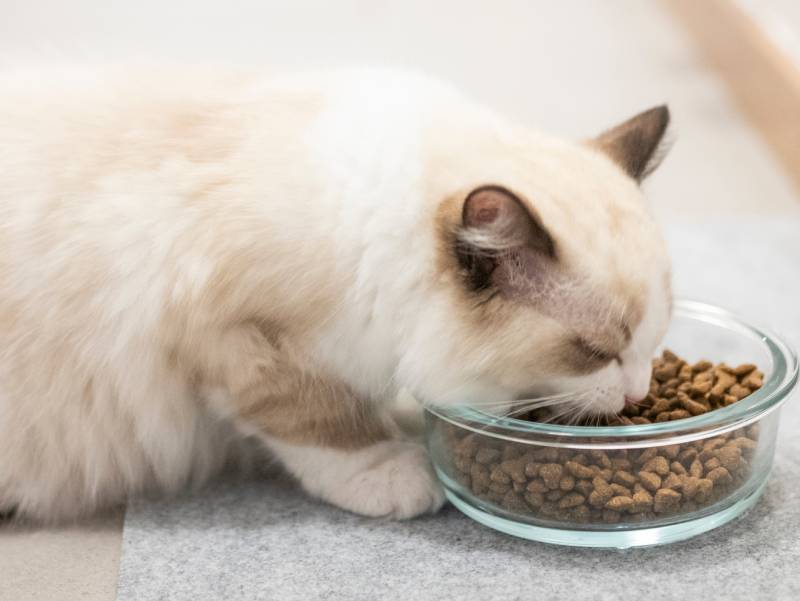
Maintain Regular Veterinary Care
Regular veterinary check-ups are vital to monitor your cat’s health and detect potential issues early on. Visit your veterinarian regularly for vaccinations, parasite control, dental care, and overall health assessments. Establishing a relationship with a trusted veterinarian ensures your cat receives proper medical care throughout the cat’s life.
Enrich Their Environment
Cats thrive in environments that offer mental and physical stimulation. It is important to provide them with opportunities for play, exercise, and exploration. Also, offer them a variety of toys, scratching posts, and climbing structures to keep them engaged and prevent boredom.
Provide a Safe Indoor Environment
Creating a safe indoor environment is crucial for your cat’s well-being. Ensure your home is free from hazards such as toxic plants, chemicals, open windows without screens, and small objects that could be swallowed.
Again, provide hiding spots and elevated resting areas where your cat can retreat and feel secure. You might also want to consider using window perches or enclosed outdoor spaces to provide a safe way for your cat to experience the outdoors.
 Conclusion
Conclusion
Cats have fascinating and complex ways of communicating with their human companions. Rubbing against you is one way of talking to you and carries significant meaning. Usually, your cat will rub against you to mark their territory, show affection, mimic mutual grooming behavior, gather information about their surroundings, or seek comfort and security.
It also allows them to express love and deepen their bond with you. However, being mindful of your cat’s boundaries and observing excessive rubbing behavior is essential. Overstimulation, attention-seeking, stress, or underlying medical concerns can contribute to excessive rubbing.
Embracing these affectionate gestures and responding with love, care, and respect creates a nurturing and fulfilling relationship with your beloved cat.
Featured Image Credit: Jaromir Chalabala, Shutterstock






